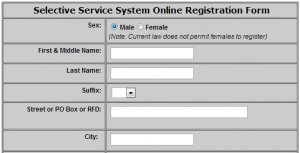In January of 2013, restrictions on women in frontline combat were lifted, opening the door for the expanding role of women in the military. Yet, due to the requirements of Selective Service registration, still only males are legally obligated to sign up for the U.S. database of potential soldiers.
Through the Selective Service System, the government is able to store information on all citizens potentially recruitable for the military. As of now, the U.S. considers this group to be

males within the age of 18 and 25. All names registered in the Selective Service System are given to a marketing association, and then used for military recruitment. Although citizens registered in the system are not automatically inducted into the military, should a crisis requiring a draft occur, names in the database would be selected at random for induction.
Senior Aneesh Prasad turned 18 earlier this year, and has completed his Selective Service Registration.
“I’m pretty indifferent,” Prasad said. “I guess that since we’re not involved in any major draft-requiring war, my opinion is more mild. But yeah, I mean, if we’re all entitled to certain rights and benefits, then it seems fair that we’re also entitled to certain responsibilities. But then again that’s my peacetime opinion.”
Junior Eric Huey, who will have to register upon his 18th birthday in about a year, feels similarly.
“I’m completely okay with it. As a United States citizen, I should definitely look to pay back to the United States,” Huey said. “I’m just hoping that there will never be a need for a draft.”
Huey also feels that the fact that Selective Service registration applies to only males is completely justified.
“I’m okay with the fact that only males are required [to register] because men are supposedly more hardened than women in general,” Huey said, despite the fact that he believes women are better able to tolerate pain than are men.
Despite the fact that the constitutionality of Selective Service’s exemption of women has been questioned on several accounts, the law remains applicable only to males. In the 1981 case Rostker v. Goldberg , the Supreme Court determined that mandating that only men register was not a violation of the Fifth Amendment, which guarantees due process.
The Department of Defense also reviewed the issue under President Bill Clinton in 1984, again determining that the fact that women were at the time excluded from front-line combat justified excluding them from registering with Selective Service. However, in January 2013 this policy concerning combat was revoked thus prompting new discussion about amending the Selective Service policy.
Prasad also has no objection to the fact that currently only males are required to register for Selective Service.
“Well, it’s understandable, considering there are physical differences in men and women and I’ve heard that to a large extent training women to be as effective in combat is much more costly, on average of course,” Prasad said. “At the same time though, in Israel and many other nations, women have to serve just like men and that’s due to the fact that, other than out in the frontline, women and men are probably equally capable.”
Senior Fangfei Li agrees to a certain extent, but believes that females should also be required to register for Selective Service.
“I think that women should also be required to do so because even if not serving in the front lines, they can still fulfill military duties,” Li said.
For now, the Selective Service law remains as it is, applying only to males. However, as the roles of women in the military continue to expand, it is possible that we’ll see a change.








